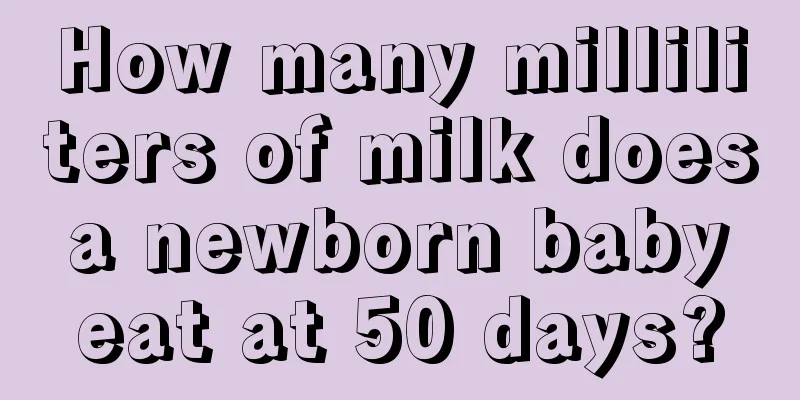How many milliliters of milk does a newborn baby eat at 50 days?

|
Under normal circumstances, if the baby eats a normal amount of milk and sleeps well, there will be no problem with the baby's development. However, many new parents do not know how to judge whether the baby is full. Therefore, many parents spend every day in worry, worrying that the baby will be hungry and the baby's growth and development will be affected. So, how many milliliters of milk does a newborn baby eat in 50 days? How many ml does a 50-day-old baby eat? Because every baby's growth and development are different, and their appetites are also different, the editor here only gives you a reference value based on the average level: the average amount of milk a 50-day-old baby drinks each time is 90-120 ml, which can be divided into 6-7 times a day, with an interval of 3-4 hours each time. The total amount of milk consumed per day is about 700-800 ml. Note: Every baby has a different appetite, so it is recommended to feed the baby appropriately based on his/her own living characteristics. How do you know if your baby is full? 1. Number of breastfeeding times: The baby needs to be fed 8-10 times a day in the first 1-2 months after birth, and at least 8 times a day at 3 months of age. 2. Change more than 6 wet diapers every day. If the baby relies solely on breastfeeding and urinates more than 6 times in 24 hours, it is a sign that the milk supply is sufficient and the baby is full. If the baby urinates less than 5 times in 24 hours, it means that the milk supply is insufficient and the baby is not full. The stool of babies who are breastfed is soft and buttery, and they defecate 2-4 times a day, which shows that the milk supply is sufficient and the baby is full. If a breastfed baby has a small amount of stool and the stool is green and foamy, it means that the new mother does not have enough milk and the baby is not full. 3. If the baby can sleep quietly for about 4 hours without crying and having a deep sleep, it means that the baby is full. 4. Changes in baby's weight often indicate whether the baby is full or hungry. The average weight gain per week is 0-170 grams, and about 200 grams at 3 months. Babies under 6 months old should gain an average of 600 grams per month or at least 125 grams per week. Babies older than 6 months gain an average of 500 grams of weight per month. These indicate that there is enough breast milk and the baby is full. If the baby's weight gain does not meet the above standards and the difference is large, after excluding diseases, it mostly means that the milk supply is insufficient and the baby is not full. 5. Expression: When the baby is full, he will be in a good mood, behave happily, joke freely, have bright eyes and be quick to react. Every baby's situation is different. As long as your child can sleep well after feeding and his urine volume is normal, you don't have to worry about the baby not getting enough milk. Generally, if the baby does not eat enough, he will cry. Although the baby cannot speak yet, it is not difficult to find out. |
<<: How to prevent hiccups in newborns?
>>: Newborn's neck always tilted back?
Recommend
What is the cause of the red anus in children? How to deal with it
Children's skin is relatively tender and can ...
What to do if baby's skin peels
The baby's body is very fragile and the baby&...
How long does it take for early pregnancy symptoms to disappear?
Most pregnant women will enter the early pregnanc...
How to relieve gas when a child has a bloated stomach
Children often have some bad habits when eating, ...
Should girls wipe or not after peeing?
In daily life, many girls choose to wipe with toi...
How to take care of your baby's fever in summer
It is hot in summer and bacteria are active, so b...
If your child is nauseous and vomiting, observe the symptoms and then treat them
Sometimes children will experience symptoms of na...
Child's oral scratch
The physical health of children is very important...
What pillow is good for newborns?
The most important thing during sleep is the pill...
What should I do if my three-year-old child has a high fever?
It is very common for children to have a fever. W...
Reasons for cold sweats in children
What mothers care about most is the physical deve...
What should we do if children beat or scold their parents? Pay attention to communication!
For traditional families, it is common for parent...
What to do if your baby's cough won't go away
The baby's cough cannot be cured because many...
How to exercise the penis at the age of thirteen
The penis is very important for men, because it i...
What to do if children cough in summer
Summer is the peak season for many diseases. If b...









